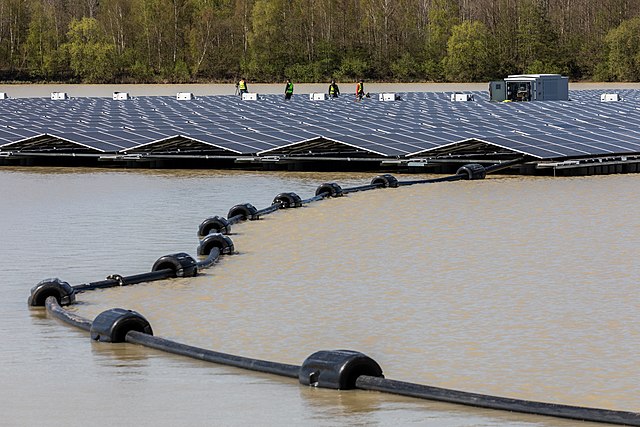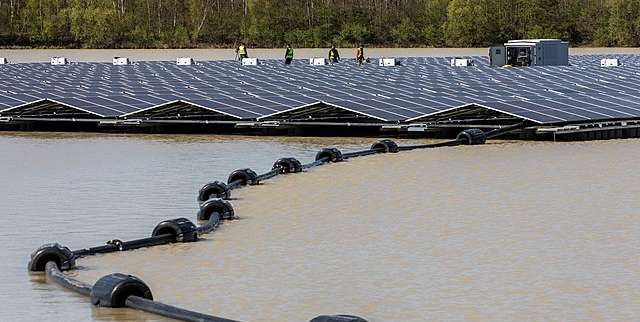After years of dealing with contaminated groundwater and an unreliable water supply, officials in Fort Lupton say a single solar project could solve both issues for the foreseeable future.
The city has an aging diesel-powered generator that has a habit of going offline at times of high demand and power outages. Officials have also been working to reduce algae blooms in their 300-acre-foot reservoir that the water treatment plant turns into drinking water.
To address both these issues, the city partnered with Brighton-based power provider United Power and contractor Schneider Electric to replace the old generator with an 850-kilowatt solar array and a 1,147-kilowatt battery storage system that floats in the city’s water treatment plant.
The project could receive up to $6.1 million in federal funds from the U.S. Department of Energy as part of its $1 billion Energy Improvements in Rural or Remote Areas Program, which was created under the Bipartisan Infrastructure Law in 2021.
However, the funding is not yet guaranteed, according to U.S. Rep. Yadira Caraveo (D-CO), who represents Fort Lupton and is pushing the project.

Fort Lupton City Administrator Chris Cross said he expects the project to increase power redundancy for the city, meaning it will have more than one power source to draw from. Cross also expects Fort Lupton residents to see roughly 9% savings on their average power bill.
Residents of Fort Lupton pay an average of $0.12 per kilowatt hour for residential power, which is about 5% greater than the statewide average, according to data from Electricity Local.
“Coupled with the floating panel benefits to the water storage, we are excited to see how high our overall savings will be from the project,” Cross said.
Fort Lupton, like many rural communities in Colorado, has faced challenges providing clean drinking water for decades. Data from the Colorado Department of Public Health and Environment shows the city has recorded 268 water quality incidents since 1995. That total is comparable to much larger cities that are fed by waters from Carter Lake like Superior, Louisville, and Broomfield even though Fort Lupton has the smallest population at just 8,500 residents.
One of the most memorable water quality incidents in Fort Lupton happened in March 2009 when residents reported that their tap water had become flammable. An investigation found that nearby natural gas wells were leaking into the city’s groundwater supply, the Greeley Tribune reported.
In November 2023, a water main break at the intersection of 9th St. and Lancaster Ave. in Fort Lupton caused a high concentration of chlorine to enter the water supply for the nearby neighborhoods. Officials with CDPHE’s water quality division told Fort Lupton staff that “there will be water quality complaints” resulting from the break and that residents should flush their ice makers and sinks, although “a mandatory advisory would not be necessary at this time,” according to emails contained in a November 2023 CDPHE water quality incident report.
The city’s most recent water quality report also shows that the city’s water treatment plant reported one health-based violation in 2023 for having an inadequate backflow prevention and cross-connection control program. This program, “Uncontrolled cross connections can lead to inadvertent contamination of the drinking water,” the report says. Fort Lupton has hired a contracting firm called Aqua Backflow to help improve its backflow issues, according to the city’s website.
Schneider Electric North America Microgrid President Jana Gerber said these are just a few of the issues that the project team wanted to address when they pitched the microgrid idea to Fort Lupton officials. Gerber added that the project could serve as a model for other microgrid partnerships in rural communities.
As part of the agreement, Schneider Electric is responsible for designing and building the microgrid. United Power would then become the owner and operator of the grid while Fort Lupton pays for maintenance. United Power also plans to partner with Aims Community College and the BUENO Center for Multicultural Education to provide contracting outreach, according to United Power CEO Mark Gabriel.
John Tracy, director of the Colorado Water Center at Colorado State University in Fort Collins, said the issues with Fort Lupton’s drinking water system are indicative of the city’s age. Fort Lupton was incorporated in 1889, and Tracy said the city’s existing water system likely dates back to the 1970s when the Clean Water Act provided billions in federal subsidies for water improvement projects.
But maintaining that infrastructure is a delicate dance that is difficult for rural communities to perform, Tracy added. Many rural towns like Fort Lupton collect enough water fees to operate their system, not improve it, Tracy said. Fort Lupton’s 2024 budget projects a 10.7% decrease in water sales tax collections and a more than 5% increase in expenditures from its water sales tax fund. The city also plans to spend more than $18 million on capital improvements for its water system over the next six years.
With all of the planned expenditures, Fort Lupton needs to find a place to cut its operating costs. That’s where the floating solar array comes in. Tracy said Other cities like San Antonio, Texas have come to the same conclusion that green technology can reduce their operating costs by reducing their dependence on fossil fuels, which are more expensive to acquire than electricity.
“Fossil fuel energy prices have been too variable and it’s difficult to blend that into a municipal budget and project what those costs are going to be two years from now,” Tracy said. “If you’re doing something like either wind or solar, you have much more predictability in the cost.”




